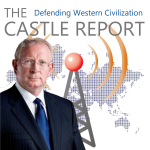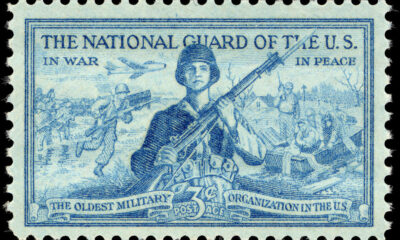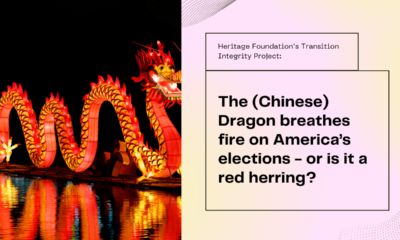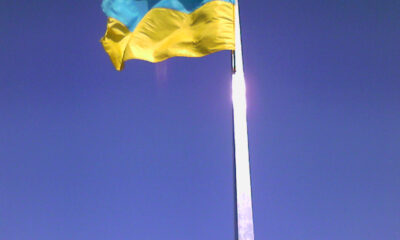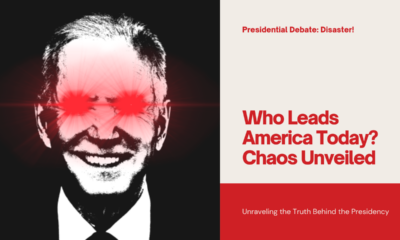Guest Columns
Six more BRICS in the wall
The new BRICS (Brazil, Russia, India, China, South Africa) community inducted six more members to create a new economic and military pact.

Hello, this is Darrell Castle with today’s Castle Report. This is Friday the 1st day of September in the year of our Lord 2023. I will be talking about the summit of BRICS nations held in South Africa, which concluded on August 24th with a momentous decision regarding expansion. The five BRICS consisting of Brazil, Russia, India, China, and South Africa decided to add six new members. What does that decision mean for the United States and the rest of the world?
BRICS from 2010 to now
For the first time since 2010 the decision was made to expand membership. Six new nations won acceptance with full membership to begin January 1, 2024. Saudia Arabia, the United Arab Emirates, Egypt, Argentina, Ethiopia, and Iran all won admission to membership. Just as the U.S. is the leader of the rules based international order and the enforcer of the rules, China and Russia are the heavy weights of the BRICS order. Their decisions regarding who gets in and who doesn’t seem to be very persuasive.
The full effects of the decision will take time to fully manifest themselves, but one thing is known for certain. BRICS now has eleven members and they are on the way to greater political power and most likely a new currency union. They are all now suffering from the weaponization of the U.S. dollar. They were all under pressure to support the U.S. imposed sanctions against Russia. But none agreed to do so. Weaponization of the dollar and the freezing of dollar-denominated reserves is a real fear. That is exactly what happened to Russia.
How weaponization of the dollar works – and why countries now are building an alternative
Nations hear that the U.S. dollar is the world’s reserve and the safest and best place for their foreign reserves. So that is where they put all the reserves that they have. The U.S. then decides that they have not followed the rules of the rules-based global order. Then their reserves are confiscated, never to be returned. The freezing of reserves cuts a nation off from international commerce. Why? Because they must now have cash since the U.S. has frozen them out of the international banking system.
Their answer is to band together and start a new currency union big enough and diverse enough to offer the exchange of goods and services and perhaps even credit that can bypass the dollar. The new currency will not be easy and will take time. But for now the members will explore trading in their own currencies as Russia and China have been doing. India is the world’s largest importer of Russian coal and it has been buying that coal in the Russian currency. China and other oil import dependent members have been buying Saudi and Russian oil in the Chinese currency. No wonder the sanctions on Russia appear to have inflicted more economic harm on Europe and the U.S. than on Russia.
A logical course for BRICS to follow
If I had control of the expanded BRICS I would use the membership and coordination to reconstruct the global structure of money, trade, use of military power and other things that would come to mind. To accomplish that, I would focus on energy, especially oil and the international oil trade. If the U.S. demanded or tried to muscle me on the use and development of fossil fuel, I would tell them to go pound sand. (No pun intended.) I would use my dominance in oil to put my members at the center rather than the bottom of the world agenda. This would mean the return of a multi-polar world and the end of U.S. dominance and hegemony.
Time will tell whether I could accomplish all that. But time, I would argue, is on my side. Because at least 40 other nations have applied for membership including Mexico. These nations would be considered one by one and year by year as new members were absorbed. I would, in other words, push back against the “New American Century” and all those neo-cons who seem to be running American foreign policy. The “Rules-based World Order” the U.S. diplomats tend to cite to justify a U.S. based outcome is not appreciated by much of the world. And now they are coming together to resist it.
Petrodollars – the first chain to break
Global oil has traded only in dollars since 1974. Indeed the dollar has been the world’s reserve since the end of World War ll. That allows the U.S. to buy an endless supply of foreign goods and pay for them with pieces of paper printed on a press and later by using mere blips on a computer screen. The U.S. as a result, has had its choice of the world’s supply of oil. They had only to ship pallets of paper in exchange for super tankers full of oil. This allowed American politicians to pretend to be environmentalists by pontificating about no new drilling, at least in America.
The new additions to BRICS, then, are all about oil. They are also about the use of dominant military power around the globe. The new alliance or association seeks to change all that, so let’s look at how oil changes things. All the six new members have something to do with oil including ancient enemies Iran and Saudi Arabia. Part of the Petro-dollar agreement with the Saudis was the U.S. guarantee of protection from Iran. But now both are BRICS members. China has been able to convince both to stop fighting and come together to break the Western dominance over them. The addition of the United Arab Emirates (UAE) along with Iran and Saudi Arabia encircles the Persian Gulf and the Strait of Hormuz through which much of the world’s oil must pass.
A new anti-American (or anti-woke) alliance
This is obviously a BRICS-OPEC alliance that at first glance could be extremely difficult for the West if it doesn’t achieve energy independence as Donald Trump was able to do. Russia and Saudi Arabia are two of the top oil producers in the world. Now they add the others to an oil alliance. Brazil is also an oil producer of great importance with its offshore deposits. China and India are two of the top oil importing nations in the world and now their supplies are assured. This all indicates a massive shift away from the use of dollars in international oil markets.
Every barrel sold in a currency other than dollars means neither buyer nor seller needs American currency. Nor do they need American banks and bankers. My view in trying to assess the impact is that all those truckloads of dollars sitting in accounts all over the world will be coming home soon to buy American assets, especially real estate at rock bottom prices. This will contribute to inflation and the sure knowledge that we are now owned, to some extent, by foreigners and are, therefore, to some extent, at their mercy. Maybe my assessment about this is wrong and I hope that it is, but I don’t think so.
Egypt and its importance to BRICS
Egypt is also a new member. While Egypt’s economy is tiny compared with the others it is geo-strategically located. Egypt controls the Suez Canal, a key transit point for oil and natural gas from the Persian Gulf to the Mediterranean and Europe. Egypt also has a strategic coastline along the Red Sea and a great deal of Mediterranean Coastline as well. I’m sure Egypt hopes a new BRICS membership will help transition its weak economy into something befitting its strategic location. The coastlines control vital choke points and shipping routes just like Naval officer and theorist Alfred Thayer Mahan listed as necessary in his book The Influence of Sea Power Upon History.
War colleges including the U.S. Naval Academy still require Mahan’s book to graduate. I’ve read it. I’m sure someone in China has read it too, but perhaps not anyone in Washington, D.C. What about Ethiopia makes it worthy of consideration? Isn’t Ethiopia just an insignificant little country in Africa? China and Russia are both committed to Africa and to driving out Western influence. But there must be more reasons than that. Ethiopia lies at the bottom of the Red Sea with Egypt at the top. That makes it also a strategic location point for international shipping and the passage of oil from producers to end users. Ship traffic in and out of the Red Sea is now clearly controlled by BRICS members. It is also a likely build-up point for trade into the heart of a developing Africa.
And now, Argentina – and Antarctica
That leaves Argentina at the southern tip of South America. Why would that nation with its runaway inflation and history of defaults to Western Banks be interesting to BRICS nations? It is rich in minerals including the new critical elements like copper and lithium. Those minerals are apparently the future of energy since the West is desperate for them to make electric car batteries. Argentina also controls the strategic sea lanes around the tip of South America. Antarctica is also an up and comer, mineral-wise and Argentina is the closest land mass to it. So, South Africa controls the tip of Africa and Argentina controls the tip of South America. Both are members of BRICS.
Alfred Thayer Mahan viewed sea power, i.e., the ability to project military power via a navy—as critical to control of the oceans of the world, and by extension control of the coastlines and vital chokepoints of the oceans of the world. His book once again, is entitled The Influence of Sea Power Upon History, and was published in 1890. It was and is the bible of the U.S. Navy and many other navies of the world. The great sea power empires like Great Britain and Japan have all relied on it. Sea power is essential for trade in the modern world. A nation must protect its trade routes and coastlines to protect its commerce in an increasingly dangerous world.
BRICS as a military alliance
Should you read Mahan’s book, you will see that military power is the first derivative of a nation’s industrial power. If there is no strong industry at home, it is impossible to develop and maintain a powerful military force. Countries who refuse to industrialize, who deindustrialize, or who ship their industry to cheap labor countries will not long remain militarily powerful. This new BRICS-OPEC alliance is laid out and strategically planned to dominate the sea lanes across the world. Those sea lanes have been under the control and protection of the U.S. Navy since World War ll. But now a new force has arisen to challenge that dominance.
The world is changing rapidly and in ways not seen in perhaps a few centuries. Energy, mineral resources, food, and the U.S. dollar as the standard are all in play. None can be taken for granted anymore. This situation reminds me a little of the Far Side cartoon. Two dinosaurs are talking and one says to the other “there’s a new ice age coming.” The other says, “yes, and we’ve got brains the size of walnuts.” I don’t think we have brains the size of walnuts. But I do think we as a nation are projecting weakness around the world and the world is taking note.
A weak President and a lack of diplomatic skill
We have a weak president who is suffering from undeniable mental and physical decline. The military is often the first and only answer to every problem. Diplomacy and the opportunity to make agreements that benefit both sides seem to be an art lost on U.S. diplomats. Since we rely exclusively on our military, logic teaches that we should protect and strengthen it. But we seem to be doing the opposite. My opinion is that our 78-year financial dominance has given us an inflated picture of our own power. Now others are intent on taking away that dominance.
What about climate change which we in the West tell ourselves is the most critical problem facing humanity? These nations do not care even a little about climate change. They contain the largest exporter and the largest importers of coal in the world. Oh, they may pay lip service to it in order to appease the West. Or they may join some “accord” to finagle money from the West. But they do not care about climate change. They see this as economic warfare and they have chosen sides and intend to win.
Direct competitors
Finally, folks, the BRICS spokesmen say that they are not trying to compete with the West. But I don’t buy that. BRICS eleven is just the beginning and it is very obviously an attempt to compete with and minimize the G-7. Which Russia was kicked out of when it was the G-8. It is, in effect, a new world order. Whether the West can compete with it, or defeat it, or whether the West will splinter with many joining the BRICS, remains to be seen. It also seems that the U.S. has badly underestimated Russia both militarily and economically.
At least that’s the way I see it.
Until next time folks,
This is Darrell Castle.
From CastleReport.us; appears by permission. – Ed.
Darrell Castle is an attorney in Memphis, Tennessee, a former USMC Combat Officer, 2008 Vice Presidential nominee, and 2016 Presidential nominee. Darrell gives his unique analysis of current national and international events from a historical and constitutional perspective. You can subscribe to Darrell's weekly podcast at castlereport.us
-

 Executive4 days ago
Executive4 days agoSecret Service chief gets no solace
-
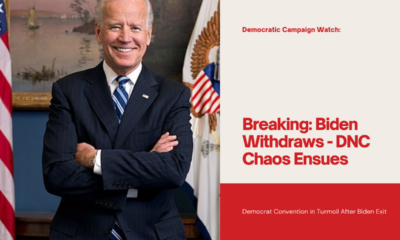
 Civilization5 days ago
Civilization5 days agoBiden drops out of race
-

 Executive2 days ago
Executive2 days agoWaste of the Day: Louisville Taxpayers Pay Nearly $600,000 For Empty Building’s Maintenance, Security
-

 Guest Columns4 days ago
Guest Columns4 days agoFear Itself: Democrats’ Favorite Strategy Caused Their Current Chaos
-

 Executive3 days ago
Executive3 days agoWhere is Joe Biden – or Jill?
-

 Executive1 day ago
Executive1 day agoWaste of the Day: Throwback Thursday: Cities Used Crime Prevention Funds on Soccer Games, Paper Shredding
-

 Civilization4 days ago
Civilization4 days agoBuild Iron Dome in the United States To Prepare for Israel’s Worst Day
-

 Executive2 days ago
Executive2 days agoFacile and politically motivated suggestions


